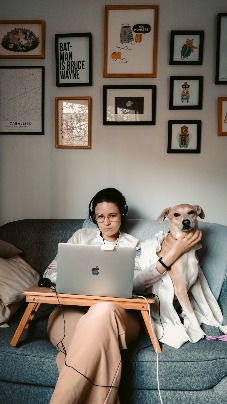Waarom elke baan lichamelijk is
| Date: | 11 April 2022 |
| Author: | Jelle Wiering |

Weet jij eigenlijk hoe jouw collega's ruiken?
Wanneer Nederlanders het hebben over lichamelijk werk, dan bedoelen ze vaak werk waar het lichaam expliciet belast wordt. Een straat leggen, dakdekken, of professioneel voetballen. Een begrijpelijke associatie, maar te simpel. Iedere baan is namelijk lichamelijk.
De hele dag voor een computer werken is zeer zeker lichamelijk. Het intrigerende voorbeeld van Emma, de op youtube te bezichtigen belichaming van ons huidige werkgedrag, is absoluut confronterend. Veel Nederlanders zitten nagenoeg de hele dag, drinken veel koffie, ervaren stress en komen aan het einde van de dag thuis om dan snel op de bank te ploffen.
Maar er is meer te zeggen over lichamelijkheid dan een ongezond of gezond categorisering. Werk wordt namelijk ook inhoudelijk gevormd door lichamelijkheid: een baan heeft lichamelijke componenten die de baan maken tot wat het is. Zelf werk ik aan twee verschillende universiteiten en dat zijn misschien wel de plekken waar lichamelijkheid het meest genegeerd en dus gemarginaliseerd wordt. Dat de inhoud van mijn werk wel degelijk lichamelijk is werd mij extra duidelijk tijdens de lockdowns. Periodes waarin ik net als veel andere Nederlanders thuis werkte.
Er zijn twee dimensie van lichamelijkheid te onderscheiden hier. Ten eerste, de manieren waarop het lichaam bewust of onbewust een rol speelt in ons werk. Het vele zitten en de consequenties daarvan bijvoorbeeld. De geweldige ervaring van goede koffie in de ochtend (of het ontbreken daarvan…) Er zijn voorbeelden genoeg.
Maar de lichamelijkheid van werk komt ook terug in hoe wij ons werk zien (letterlijk) en op andere manieren waarnemen. Nu ik erover nadenk weet ik van best wat collega’s hoe zij ruiken. Ik herken hun stem en ik weet ook gelijk wanneer hun stem afwijkt, bijvoorbeeld als ze moe zijn of als er iets is. Maar ik kan ook vaak goed bepalen of een collega haast heeft, druk is, of in voor een gesprekje over niets. Geen idee hoe ik dat precies observeer, maar lichamelijk is het zeker.

Typerend is dat ik mijn tijdens de lockdowns mijn werk echt minder leuk vond. Het grootste probleem was dat mijn collega’s opeens waanzinnig efficiënt waren. Ik zag een ongekende discipline, waar helaas een prijs voor werd betaald: minder sprankjes in de ogen. Veel minder gelach. Geen informele praatjes en als die wel plaatsvonden, waren ze geforceerd. Ik had vooral collega’s die super doelgericht aan het werk waren. Vaak waren er op de achtergrond partners, kinderen of kluswerkzaamheden te zien of te horen, waardoor mijn collega’s continu aangemoedigd werden om toch vooral efficiënt te zijn. Anders konden ze namelijk beter iets met die partners, kinderen of klussen gaan doen.
Ik heb collega’s horen beweren dat de lockdowns voor ons, academici, niet zo gek veel uitmaken omdat we toch vooral lezen en schrijven. Sommige van hen vonden de lockdowns zelfs wel handig, omdat het hen veel reistijd bespaarde. Voor mij ligt dit dus totaal anders. En eigenlijk maak ik mij wel een beetje zorgen om het verschil in ervaring… Het komt er namelijk op neer dat zij een behoorlijk ander beeld hebben van wat voor werk we doen. Zij hebben vast geen idee hoe ik ruik…
Jelle Wiering
Why every job is physical
Do you know what your colleagues smell like?
Whenever Dutch people talk about physical labor, they often mean labor which explicitly engages the body. Building a road, thatching a roof, or professional football. An understandable connection, but it is too simple. Every job is, in fact, physical.
Working behind a computer all day is absolutely physical. The intriguing example of Emma, the embodiment of our current work habits that is viewable on Youtube, is very confronting. Many Dutch people sit for a large part of their day, drink a lot of coffee, experience stress and then arrive home at the end of the day to quickly crash on the couch.
But there is more to be said about embodiment or physical labor than a healthy/unhealthy categorization. Labor is, in fact, also shaped intrinsically by physicality: a job has physical components that make the job into what it is. I work for two universities myself and that might be one of the places where embodiment is the most ignored and marginalized. That the content of my work is actually physical became especially clear to me during the lockdowns. Periods in which I, like many other Dutch people, worked from home.
There are two dimensions of physicality to be distinguished here. Firstly, the manners in which the body consciously or unconsciously plays a role in our work. The large amount of sitting, and the consequences of that, for example. The amazing experience of good coffee in the morning (or the lack thereof…) There are plenty of examples.
But the physicality of labor also returns in the way we see our work (literally) and how we perceive it in other ways. Now that I think about it, I know for a fair amount of colleagues what they smell like. I recognize their voice, and can immediately tell when their voice sounds off, for example when they feel tired or something is wrong. But I can also determine when a colleague is in a hurry, is busy, or in the mood for a conversation about nothing at all. No idea how I observe this, precisely, but it is certainly physical.
What is typical is that during the lockdowns, I really did not like my job as much. The biggest problem was that my colleagues were suddenly incredibly efficient. I saw an unprecedented rigor, which unfortunately had a price: the sparkle in their eyes disappeared. Less laughter. No informal conversations and if they did take place, they felt forced. I mostly had colleagues that were very target oriented. Often I could hear partners, children, or small construction projects in the background, which continuously encouraged my colleagues to be efficient. Otherwise, they’d be better off doing something with those partners, kids, or projects.
I’ve heard colleagues say that the lockdowns weren’t very impactful for us, the academics, since we mostly read and write anyway. Some of them even found the lockdowns convenient, because it saved them a lot of time commuting. For me, this is totally different. And this difference in experience does worry me a bit… Because it shows that they have a substantially different view of what kind of work we do. They probably have no idea what I smell like…
About the author

Jelle is a postdoctoral researcher at the Faculty of Theology and Religious Studies, University of Groningen.

